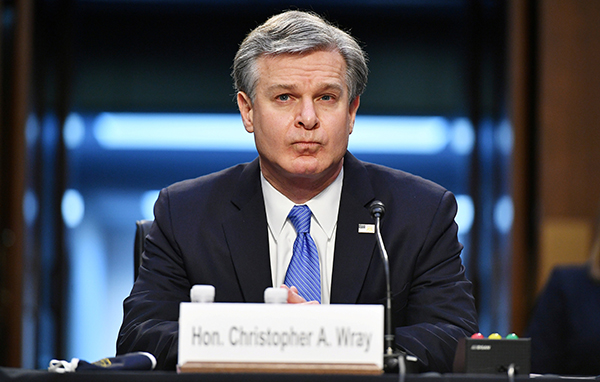
WASHINGTON — House Judiciary Chairman Jim Jordan subpoenaed FBI Director Christopher Wray on April 10 for documents related to a now-withdrawn FBI field office memo about developing sources in Catholic parishes to report suspicious activity that could involve domestic violent extremism.
Jordan, (R-OH) said his committee is seeking “all responsive materials without redaction.”
In a letter attached to the subpoena, he said the Jan. 23 internal memo from the Richmond, Virginia field office suggested that certain Catholic Americans were targeted by the FBI and could be considered domestic terrorists. It also said the FBI was seeking “to enlist Catholic houses of worship as potential sources to monitor and report on their parishioners.”
The subpoena comes after House Republicans sought information about this memo from Wray two other times.
In the April 10 news release by the House panel it cited the FBI’s 18-page report in response to House Republicans’ query was both substandard and partial and contained “significant redactions.”
“From this limited production, it is apparent that the FBI, relying on information derived from at least one undercover employee, sought to use local religious organizations as ‘new avenues for tripwire and source development,’” the release said.
The document in question on “radical Catholic ideology” describes a plan to develop sources in Catholic churches across the country to act as “tripwires” to raise any alarms about suspicious activity.
It also described the ideology of “radical traditionalist Catholics” as potentially amounting to an “adherence to anti-Semitic, anti-immigrant, anti-LGBTQ and white supremacist ideology.”
Soon after the memo was leaked, it was withdrawn and removed from the FBI’s database.
Wray has also condemned the memo. In a March 8 hearing of the Senate Intelligence Committee, he said that when he first learned of it, he was aghast and said it did not reflect FBI standards.
“We do not conduct investigations based on religious affiliation or practices, full stop. We have also now ordered our Inspection Division to take a look at how this happened and try to figure out how we can make sure something like this doesn’t happen again,” he said.
Wray added that the memo was the product of one field office and said that once it came to light, FBI officials took action. “We do not and will not target people for religious beliefs, and we do not and will not monitor people’s religious practices,” he told committee members.
An FBI statement on April 10 said that it “recognizes the importance of congressional oversight and remains fully committed to cooperating” with the House Committee’s requests.
When news of the memo was initially released, Bishop Barry Knestout of Richmond, Virginia, expressed concern about it. He said in a statement that some of the groups named in the memo are not in full communion with the church, but added: “If evidence of extremism exists, it should be rooted out, but not at the expense of religious freedom.”
“A preference for traditional forms of worship and holding closely to the Church’s teachings on marriage, family, human sexuality, and the dignity of the human person does not equate with extremism,” he added.
Virginia Attorney General Jason Miyares and attorneys general from 19 other states wrote to Wray and U.S. Attorney General Merrick Garland condemning the memo as anti-Catholic.
Cardinal Timothy Dolan of New York, chairman of the Committee for Religious Liberty with the U.S. Conference of Catholic Bishops, was also critical of the FBI memo.
In a Feb.16 statement, he said he agreed with Bishop Knestout that the memo was “troubling and offensive in several respects — such as in its religious profiling and reliance on dubious sourcing,” and he was glad it had been rescinded.
“We encourage federal law enforcement authorities to take appropriate measures to ensure the problematic aspects of the memo do not recur in any of their agencies’ work going forward,” the cardinal said.
He also added that anyone who “espouses racism or promotes violence is rejecting Catholic teaching on the inherent dignity of each and every person. The USCCB roundly condemns such extremism and fully supports the work of law enforcement officials to keep our communities safe.”

WHAT WILL THE BISHOPS OF THE USA DO ABOUT THIS?
Of all people, Jim.Jordan, to be investigating any person or group. There are priests who use their parishes to rant their extreme right and display irrational behavior to mislead their parishioners. Perhaps the Bishops should seek them out and remove them positions of authority. I have seen such rants on Facebook.